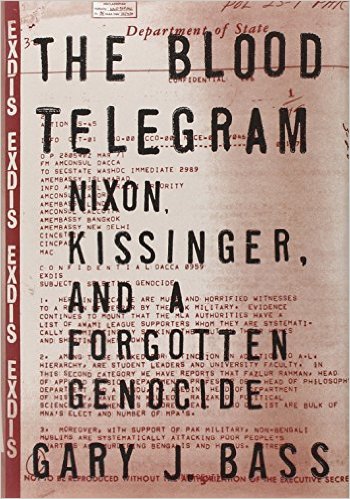[alert variation=”alert-info”]Publisher: Alfred A. Knopf
Formats: Hardcover, Paperback, eBook, Kindle
Purchase: Powell’s | Amazon | IndieBound | Barnes & Noble | iBooks[/alert]
The Blood Telegram: Nixon, Kissinger, and a Forgotten Genocide, by Gary J. Bass, provides the Cold War context of the Bangladeshi Liberation War, where the Nixon White House stood at odds with democracy and supported a genocide within what was once East Pakistan. The events of 1971 are the primary national trauma of Bangladesh, which is no surprise since Bass recounts that more than a million people were killed and ten million refugees fled to India, most of them Hindu. It was a pivotal event for national security calculations of both Pakistan and India as well. Bass gives these other states and stakeholders time in the spotlight so we can get a view the mainstream history and news doesn’t give us. The double-crossing intrigue and heroic or vitriolic speech of the high-level actors in this drama are the compelling reason to continue reading this broad chronology of a forgotten chapter in history – indeed, the taped conversations between Nixon and Kissinger are often shocking. For the US reader, the book exposes the orchestration and intent behind the US approach to any country – our government does its best to decide which country’s crisis is most important, but in The Blood Telegram this nearly gets the better of us. To the dismay of contemporary Bangladeshis, their history is still largely a matter of ignorance in the US, but The Blood Telegram is an antidote to the “tsunami-and-poverty” script about Bangladesh.
[signoff predefined=”Social Media Reminder” icon=”facebook”][/signoff]

